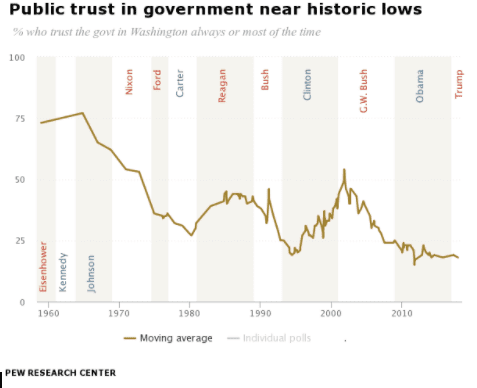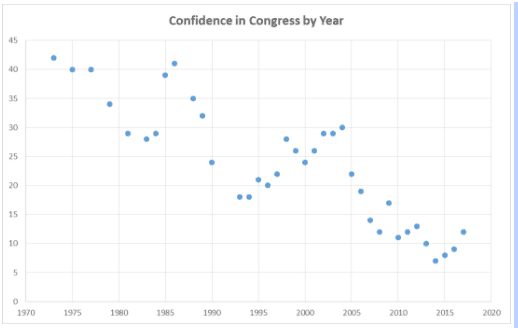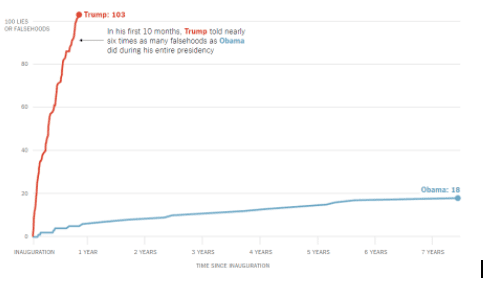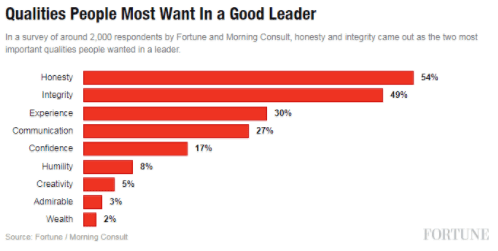What Happened to the Political Price for Lying?
by Cactusman
What Happened to the Political Price for Lying? (Part one of two)
James Comey’s recent interview on ABC has resurrected questions about the importance of honesty in public officials. One of the key themes of Comey’s interview, and apparently his soon-to-be-released book, is that Donald Trump is “morally unfit” to be president because, among other things, he lies constantly.
Certainly Comey’s statements reflect a broad public despair about how untrustworthy the institution of the presidency is, as shown in the following chart from the Pew Research Center.
The level of public trust in government has actually been on a long-term decline over the last half century. And that decline isn’t limited to the presidency. The following chart uses data from Gallup to show percent of respondents who say they have a “great deal” or “quite a lot” of trust in Congress by year from 1973.
With the American public holding such little confidence in the federal government, the value of an honest politician seems like it should be at an all-time high. But if that were the case, a politician known to be a consistent liar would pay a heavy price for his duplicity.
Donald Trump’s election appears to disprove any such premium on honesty or penalty for lying. Take, for example, the following chart from The New York Times benchmarking Trump’s falsehoods to Obama’s.
Or consider the analysis done by PolitiFact that shows only 16% of Trump’s public statements are true or mostly true, with the rest being some type of falsehood. A similar analysis by The Washington Post found that Trump made 1,628 false claims in 298 days for an average of 5.5 (public) lies per day. Objectively, then, Trump is an incredibly dishonest man.
Trump’s dishonesty has been well known and well documented throughout his career and presidential campaign. So only a few possibilities can explain his election; his voters must be either delusional about his dishonesty, they don’t care about honesty, or they do care but not very much.
Starting with the delusional possibility, it seems unlikely that most of the 62,984,825 people who voted for Trump are entirely unable to discern fact from fiction. So while I can’t rule it out, I’m going to move on.
To address whether voters say they care about honesty, we can examine polling data, such as the chart below from Fortune, which shows that honesty is actually the number one quality people say they want in a leader, followed closely by integrity.
In fact, when broken out by political party, the Fortune poll showed that Republicans actually ranked honesty higher, at 57%, than Democrats did at 46%. (On a side note, this data is from 2016 and the most recent I could find. It would be interesting to refresh these poll numbers and see if opinions have shifted since then.)
If voters say honesty is important, and they’re not delusional, the incongruity of electing an inherently dishonest person indicates the voters themselves are not being terribly honest about how much they value honesty.





“indicates the voters themselves are not being terribly honest about how much they value honesty.”
Word.
A Rep pol can do anything they want as long as they have gained their racist merit badges. Nothing else matters.
But they can’t say that out loud (well, most of them). This also shows why polling is so flawed. How can you measure anything when the people being polled are lying?
It is like the mostly fictitious “Obama to trump voters”. Yeah, I am sure there were some, but most of these people who state this meme are just trying to cover up voting for a lying, racist imbecile.
“I can’t be a racist, I voted for a black man”
They lie.
Cue the concern trolling about how criticizing the Trump voter will only alienate them in … 3 … 2 … 1 …
“indicates the voters themselves are not being terribly honest about how much they value honesty.”
They value tribal identification, not honesty.
Before the election, an uninformed voter could be duped. He had no political record. They could have just considered it hyperbole and wishful thinking. His core doesn’t though. They don’t care if he says anything, does anything, so long as they get what they want. His dishonesty made he electable, but will it make him re electable? I doubt it.
Lord:
Here something for you to read. http://angrybearblog.com/2017/07/will-the-reign-of-witches-pass.html
When the US war profiteers need a war you make out very well to lie!
Truth has been a casualty of mobilizing for war since 1947 so the pentagon could make money. Now the pentagon has the Saudi Wahhabis as their main focus for business development!
Long line of media lies:
Concerning Syria fake civil war and false flags in particular the media along with the US and UK representatives to OPCW propagandists are on the peak of the Mound of Stupid:
And their apologists refuse to move along the curve.
To clarify the difference between ignorant and stupid is stupid is a willful neglect for truth.
Pointing out misinformation, logical fallacy, impossible physics and other blither published to support US/UK/France bombing for al Qaeda is not conspiracy theorizing!
Google “syria news conspiracy theories” for pages of attacks on anti Wahhabis.
https://www.google.com/search?source=hp&ei=L8XYWvTpDeyhggeMqLrACQ&q=syria+news+conspiracy+theories&oq=syr&gs_l=psy-ab.1.1.35i39k1l2j0i131i20i263i264i46k1j46i131i20i263i264k1l2j0i131k1j0l3j0i131k1j0l2.1486.2180.0.6946.4.3.0.0.0.0.218.569.0j2j1.3.0….0…1c.1.64.psy-ab..1.3.568.0…0.cbtCi_QbfJg
The Wahhabists’ lap dogs’ information war does not care about absence of evidence, it is all cherry picking to sell their demand to give Syria to terrorists.
The Russian veto of renewing the UN OPCW mission is directly related to Sir Geoffrey Adam’s position of the mound of stupid, low esteem for evidence and bent toward faulty logic. The UN allowed the political nature of OPCW making the entire UN organization suspect! If you care about truth you support Russia vetoing the politicized OPCW.
A conspiracy for truth is scaring the terrorists!
Never attribute to ignorance what can be explained by malice.
seems to me (subject to error) that the chart does not support the author… people voted for Trump BEFORE they knew he was not honest (or before the Dem’s started calling him dishonest).
the rest of the chart shows a growing distrust of presidents since Kennedy…i suppose the Johnson lies about the light at the end of the tunnel got people to thinking (no special reason to believe Ike or JFK were more honest than any other president, but the public had not gotten used to the idea that the president of the united states might be a liar).
but the chart also shows that Republican presidents are trusted more than Democrats… which seems to me to be strictly a function of the Republican lie machine being better than the Democrat lie machine.
which is a question of who has the better lie machine, not a question of which presidents are more honest, or even of some kind of native public opinion about honesty… i.e. it’s the propaganda, stupid.
When lying is the expected norm from politicians, how does the expected become a political price? Continuing to call Trump a liar is not working for this very reason.
Dale, “but the chart also shows that Republican presidents are trusted more than Democrats… which seems to me to be strictly a function of the Republican lie machine being better than the Democrat lie machine.” It’s not about the lies it’s about the name calling and reaction from being called the many derogatory names.
I think calling a YUUGE swath of voters “DEPLORABLE” might have been the turning point. The constant name calling coupled with “DEPLORABLE” has created a need for a hero who confronts and destroys the myths. Guess who that is.
Yeah, no.
“We begin in Kansas, where professional snipe-hunter and vote-suppressor Kris Kobach has had a further lesson in why federal judges don’t find him, his half-baked conspiratorial ideas, his anti-democratic approach to democratic elections, or his clever wordplay amusing. From The Kansas City Star:
In her ruling, U.S. District Judge Julie Robinson in Kansas City, Kan., referred repeatedly to Kobach as acting “disingenuously.” She chastised him for failing to treat the voters affected by the ongoing court case the same as all other registered voters in accordance with a previous court order. “The term ‘register’ is not ambiguous, nor should there have been any question that these voters were to be treated just like any other registered voter,” Robinson said in her order. Instead of a fine in the contempt matter, Robinson ordered Kobach to pay attorneys fees for the plaintiffs in the case. “The Court is troubled by Defendant’s failure to take responsibility for violating this Court’s orders, and for failing to ensure compliance over an issue that he explicitly represented to the Court had been accomplished,” Robinson wrote.
Kobach is as much a recidivist offender as any serial criminal can be. He persists in misrepresenting himself to the court, ignoring court orders, and generally behaving in such a fashion that, were he a young black man with a penchant for robbing bodegas instead of a secretary of state with a pronounced contempt for all courts, he’d have been hauled off in irons long ago.
In 2016, Robinson ordered Kobach to fully register thousands of Kansas voters who had registered at the DMV but had failed to provide proof of citizenship, such as a birth certificate or passport, as required by a Kansas law that Kobach crafted. Robinson had earlier scolded Kobach for initially informing the voters covered by her order that they were registered only for the 2016 election and for failing to ensure that they receive the same postcard notifications about their registration as other voters. Robinson told Kobach during a 2016 telephone conference that she would hold him responsible for directing counties to send out these postcards. He promised to do his best and narrowly dodged a contempt hearing in 2016 because of this agreement. “He admitted several times during the hearing that he understood the Court’s order meant he was to treat those covered by the preliminary injunction the same as all other registered voters, which included sending the standard postcard upon registration,” Robinson said in Wednesday’s order.
With all this, Kobach is still a decent bet to be the next governor of Kansas. One thing this president* has taught this generation of Republican politicians is a whole new refinement of the technique of brazening things out. You can see it with how Scott Pruitt has bulletproofed himself for the moment, and the way Eric Greitens is clinging to the governorship of Missouri despite a collective bipartisan nausea at the very idea. Kobach has learned this very well, although it sounds like Judge Robinson isn’t giving Kobach any marks for artistic merit.”
https://www.esquire.com/news-politics/politics/a19866066/kris-kobach-voter-suppression-arizona-wisconsin/
The deplorables only want one thing from their candidates. And they all deliver.
BTW, exactly how are people somehow wrong for calling trump a liar? He is so far off the charts you can’t see the charts from where he is:
“When President Trump sat down with the New York Times for an interview recently, he said something untrue about every 75 seconds.
That’s not just the usual political boasting and grandstanding. Those were actual, verifiable claims which professional fact checkers investigated and found to be untrue…..
A year-end review of untrue claims from FactCheck.org found Trump dominating the list with remarks on everything from his inauguration to the Russia investigation to his own tax bill. Of PolitiFact’s 483 fact checks on Trump so far, 69% were rated “mostly false,” “false” or “pants on fire,” and his claims on Russian meddling were the “Lie of the Year.” The Washington Post found 1,950 false or misleading claims made over 347 days.”
http://time.com/5084420/donald-trump-lies-claims-fact-checks/
This is what these people are.. It is just unbelievable what they do.
“It is perhaps fitting that it is during this gloomy half-springtime we’re enjoying here in the Commonwealth (God save it!) that I checked out Time’s list of the 100 Most Influential People—which I read every year, but usually for laughs—and I found the three saddest words I ever read in English.
By Ted Cruz
And he wrote this, of the man who slandered his wife, accused his father of being in league with John F. Kennedy’s assassins, and repeatedly called him “Lyin’ Ted” while mocking Cruz’s religious faith.”
https://www.esquire.com/news-politics/politics/a19864673/cruz-praise-trump-time/
I did not copy cruz’s praise of trump.. But can you imagine the thought process involved with cruz writing it? there is no soul there.
Few conclusions, actually none, about the public’s concern with respect to honesty can be drawn from comparing Trump and Obama, who were not running against each other in any election. A comparison between Trump and Hillary Clinton might be more to the point.
“A wise ruler, therefore, cannot and should not keep his word when such an observance of faith would be to his disadvantage and when the reasons which made him promise are removed. And if men were all good, this rule would not be good; but since men are a sorry lot and will not keep their promises to you, you likewise need not keep yours to them. A prince never lacks legitimate reasons to break his promises.”
Niccolo Machiavelli
so, lying is now a virtue
damn, just, damn
Emichael,
The great thing about “The Prince” is that looks at the world as it IS, not how it should be.
Bill H “A comparison between Trump and Hillary Clinton might be more to the point.” I agree. How long before Hillary is finally seriously investigated.
The released Comey memos tell us how badly the Dems have over played the Russia, Russia, Russia move and how much Comey and the Dems have lied.
With the release of the DOJ IG Report we are seeing how poorly run or BIASED was the Obama FBI. Will McCabe be the first unraveling of the Obama weaponization of the Executive Branch agencies against political enemies.
If so then then, the Obama Trump comparisons are more than appropriate.
CoRev
i actually agree with you.
i don’t think Hillary was thinking of “all Republicans” with her “deplorables”… she was thinking of rabid racits (not all “racists” are rabid)… but she was heard as calling all Republicans deplorables, and that’s what counts.
moreover, the Dems don’t recognize their own liars, and their own lies.
But I think Trump may have taken lying to a new level that not even Dick Cheney could match. Cheney seemed to love lying to people’s faces, and they loved him for it. Trump seems to think he is actually fooling people… and he may be. or he is mostly fooling himself. So in Trumps case what we may have here is not so much a liar as a bad liar. Or maybe not. He seems to be keeping his base, while those deplorable “progressives” go crazy whenever they hear him lying.
” How long before Hillary is finally seriously investigated.”
We passed the two decade mark quite awhile ago. It has been in all the papers
In addition to the following traits, lying is another reason trump can’t find an attorney worth ten cents:
“Donald Trump has a well-earned reputation for flagrantly disregarding his attorneys’ advice, and then refusing to pay them for services rendered; also, for bragging about sexually assaulting women, praising white nationalists, denigrating racial and religious minorities, and trying to undermine the rule of law in the United States.
These infamous habits have made it exceedingly difficult for the president to find quality legal representation. So, last Friday, Trump found himself ringing up his old divorce lawyer to get some fresh perspective on his myriad legal woes…
That attorney, Jay Goldberg, proceeded to tell the president that his longtime lawyer (and current target of federal prosecutors) Michael Cohen “will never stand up [for you]” if charged by the government. Days later, Goldberg told The Wall Street Journal the same thing — going so far as to liken Cohen to the Gambino crime family’s famous snitch, Sammy ‘the Bull’ Gravano. That latter move was a bit strange; as Jonathan Chait observed, Goldberg’s comments to the Journal plainly imply that the president is guilty of a crime that Cohen could reveal to authorities.”
http://nymag.com/daily/intelligencer/2018/04/trump-lawyer-cohen-will-lie-to-avoid-being-raped-in-jail.html
EMichael
please don’t think that my agreeing with CoRev partially above means that I am disagreeing with you.
you are quite right about the Republican liars. but more than that, they are evil whether they are lying or not. the thing about the Democrat liars is that it is hard for us to see they are lying because they are telling us what we want to hear.
meanwhile they vote for the Iraq war and the big bank bailout. But while telling us they are against racism and for the poor they never seem to do anything that actually helps the poor or does anything about racism except poke their finger in the eye of people who are their natural consistency.
“racism” is fact of human psychology. but most “racists” are also decent people who would be glad to give up their racism if they were not being worked up by the rabid (and politically cynical) racists while being offered nothing by the people who claim to be on their side.
oops
re-readiong some of the comments above, and those that appeared after i started writing my own, i need to take back much of my “i agree with… or “i don’t disagree with…”
both sides seem to have ideas they cherish so much they can’t let them go. which may be why there is “no political cost to lying.”
all we have seen here is that “lying” has become an acceptable political “meme” (where it was not when Ike and JFK were presidents) so now we have two parties (at least) calling each other liars…. which they are mostly.
Dale, I agree (I think) wiht much of what you said, but you included an interesting dichotomy: “you are quite right about the Republican liars. but more than that, they are evil whether they are lying or not. the thing about the Democrat liars is that it is hard for us to see they are lying because they are telling us what we want to hear.”
and then saying this:
“they (Dem pols) never seem to do anything that actually helps the poor or does anything about racism except poke their finger in the eye of people who are their natural consistency.”
What is evil? What is the bigger lie, “telling us what we want to hear.” and/or “never seem to do anything that actually helps the poor or does anything about racism”
“they never seem to do anything that actually helps the poor”
Well, perhaps you should give some thought to where the control of our government has rested for much of the last 50 years. Y’know, from the time Dems made black people actual citizens and gave seniors healthcare. And pay attention to which party gave us, and protects social security.
Meanwhile, the first time the Dems had a chance to institute their policies since 1994 they gave us the ACA. Which gave free healthcare to millions of poor people, and gave millions of low income people cash to pay for their healthcare. And paid a third of the cost by taxing the highest income people in the US.
“http://acasignups.net/spreadsheet-med
They are not close to each other.
CoRev
stay tuned
i talk about all these things all the time. doesn’t seem to help much.
“what we want to hear” is what politicians do. they have to.
being evil is probably “what people do”. can’t help themselves. currently i regard Republican evil as much more dangerous than Democrat evil. you may have a different view.
thing is, Republicans these days call openly for evil. Democrats promise good, but never deliver anything that actually makes a difference.
And, just to boil the pot, I have attended Democrat party meetings where the evil in the chair was palpable, and the poor confiding “little people” just ate it up, having no ideas of their own. in contrast i have attended Republican party meetings where i felt in danger of my life if i said the wrong thing.
i don’t think this is a natural difference between Republicans and Democrats, just the way politics has fallen out for these times.
EM
well, as for protecting Social Security, Carter, Clinton, and Obama were ready to sell out Social Security, and I can’t find a single Democrat politician who even understands that SS is not part of the budget or wants to hear that the workers can keep Social Security simply by paying for it an extra dollar a week.
I’d agree about Social Security being given to us by “the Democrats” ( actually by “a” Democrat named Roosevelt), and they gave us a huge change in the treatment of Blacks… with , I think, some help from Republicans named Eisenhower and Warren
but heck, that was only fifty years ago or so. go back a hundred and fifty years ago and you find a Republican named Lincoln actually freeing the slaves.
So progress is made from time to time.
I think “making the rich pay” for Obamacare was a mistake… in any case it looked too much like Romneycare for my taste.
we could go on and on…. not understanding each other. but right now i have to get back to the real world. see ya later.
Dale, when you get a chance describe what you consider Republican evil or at least give examples. Thanks.
Both main stream parties have a competing claim to best liar of the world. However the complicit press is also in the running.
The entire Russiagate thing has nothing to do with OMG!!!! “Muikan democracy attacked”!! That was the billionaires decades ago.
The DMC line is “Remember the Maine” US has been attacked to sell a new cold war. McCain, Graham and McConnell are singing the same tune from the Cheney neocon side with a little more experience. While most dems in congress are in the “no longer weak on wars of choice” neocon side.
Progressives for war are neocons for marriage equality, while the GOP are neocons pandering to the Salafi terror empire.
Actually, I think DNC types are good with “busting up Syria for the Salafis” as well!
Putin, Xi and Kim are passing the popcorn around!
Politics in the US is the big con!
Is it not if lies support my position I am happy with that?
If the truth supports my position all the better.
If the truth discredits my position not good with that.
The idea that one can have one’s own opinion but not one’s own facts even that is discredited.
The goal is not to have facts matter.